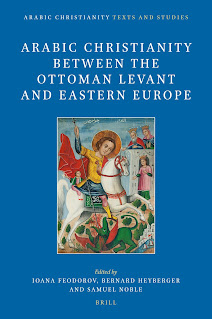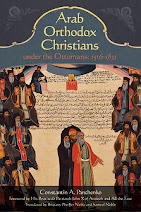German original here.
Islamists Threaten Christians in Refugee Centers
In German asylum centers, Christian refugees are exposed to assaults from fanatical Muslims who live according to Sharia. Fundamentalists are even threatening them with murder.
by Freia Peters
Said from Iran sits below a picture of Jesus on the cross around which is Persian writing. It is a quotation from the Bible: John 8:12, "I am the light of the world. He that follows Me shall not walk in darkness."
Said is a kickboxer. He crossed Turkey on foot. He never would have thought that his problems would only really begin in Germany. "In Iran, the Revolutionary Guards arrested my brother in a house church. I fled from the Iranian secret police because I thought that in Germany I could finally live my religion freely," says Said. "But at the home for asylum-seekers, I cannot openly admit that I am a Christian. If I did, I would feel threatened."
Said lives in a home for asylum-seekers in southern Brandenburg, near the border with Saxony. It is one of the so-called "jungle-homes", without any connection to a bus line. Mainly Syrian refugees live there-- mostly devout Sunni Muslims. "They wake me up before dawn during Ramadan and say that I should eat before the sun comes up. If I refuse, they say that I am 'kuffar', an infidel. They spit on me." Said says that he has called the security service. They were not interested in his problems. "They are also all Muslims."
Pastor Gottfried Martens sits beside Said in the community hall of Trinity Evangelical Lutheran Church in Berlin-Steglitz, a stack of papers on his lap. They are his letters to the heads of various refugee centers, to the office of social security, to the Berlin State Office for Health and Social Services, which allocates the refugees to temporary shelters. The writings are cries for help, in which Martens asks them to protect members of his community or to move them to another home. "Sometimes the director of the home tries to help. Sometimes I get no answer," says Martens.
Around 600 Afghans and Iranians belong to his church. He baptized most of them himself. Almost all of them have big problems in their homes," says Martens. "Devout Muslims teach the view their that 'where we are, there rules Sharia, there rules our law.'" Christians cannot cook their food in the kitchen. Those who do not pray towards Mecca five times a day are bullied. "Above all, Christians who have converted from Islam have to suffer as a minority," says Martens. "And they ask themselves the question, 'What happens when the devout Muslim refugees leave the home? Must we as Christians in the future hide ourselves in this country?'"
The fanatics sound like the murderers of the Islamic State.
Said's story is one of many in recent weeks. In Hemer, Sauerland, Algerian asylum-seekers attacked an Eritrean and his pregnant wife. Both were wearing their baptismal crosses around their necks. One of the Algerians struck the Eritreans with a glass bottle.
A young Syrian in a preliminary refugee center in Giessen reported threats. He is concerned that among the refugees there are followers of the terrorist group the Islamic State. "They shout verses from the Qur'an. They are the words that the Islamic State shouts before they cut off people's heads. I cannot stay here. I am a Christian," he says. In Ellwangen, Baden-Wurttemburg, there was a mass brawl between Christians, Yezidis and Muslims during Ramadan.
The case of an Iraqi Christian family housed in a refugee center in Freising, Bavaria is especially dramatic. The father told a television crew from Beyerische Rundfunk about beatings and threats from Syrian Islamists. "They yelled at my wife and beat by child. They say, 'We will kill you and drink your blood.'" The family lived like prisoners in a room of the home until they were no longer able to bear it and returned to Mosul in Iraq.
However in the meantime, Christians can no longer live in Islamist Mosul. The family was displaced a third time and have moved with two small children to Erbil in Northern Iraq. "They are doing very poorly," says their lawyer, Christian Salek from Munich. "I would have liked to help them and I have written to the Ministry of the Interior, but there is no way to bring them back to Germany." Anyone who applies for asylum and then leaves the country has to sign that they will not ask to be received a second time.
The underreporting of cases is high.
"One might have been able to protect the family," says Simon Jacob of the Central Council of Eastern Christians. Stories like this no longer surprise him. "I know of very many reports of Christian refugees who are under attack. But that's just the tip of the iceberg," says Jacob. "The number of unreported cases is high. We must anticipate further conflicts that refugees bring to Germany from their homeland. Between Christians and Muslims. Between Shiites and Sunnis. Between Kurds and extremists. Between Yezidis and extremists." Jacob argues that refugees should initially be accommodated separately by religion. But this could not be a long-term solution.
Jacob calls for formulating a guiding principle for Germany, in which are anchored the fundamental values of democracy and a pluralistic society. Freedom of religion. Freedom of expression. Equality between men and women. "We need a clear statement as well as orientation for refugees, also to help them differentiate themselves from extremists," says Jacob.
"Of course, refugees bring along their own experiences of conflict, for example between Shiites and Sunnis or Christians and Muslims," says the renowned historian and researcher on migration, Klaus J. Bade. He calls for socio-political vision and future-oriented concepts for the imminent issues of integration. He also calls for an enhanced guiding principle, with which Germans and also the refugees can and must identify. "This is the price that each immigrant who wants to live in Germany must pay. Bade calls for an integration course tied to orientation help, tailored to the respective country of origin.
Christians and Yezidis are most at risk.
"Frequently the aggression comes from Afghans or Pakistanis, who are often even more Islamist than some of the Syrians and Iraqis," says Max Klingberg of the International Society for Human Rights who has been active in caring for refugees for 15 years. He believes that the violence in the refugee centers will continue to increase. "We must rid ourselves of the illusion that all those who arrive here are human rights activists. No small proportion of the current new arrivals are at least at the level of the Muslim Brotherhood in their religious intensity."
The closer people live together, the sooner religious and political conflicts break out. "Reports are being made of threats of decapitation by Sunnis against Shiites, but the hardest hit are Yezidis and Christians," says Klingberg. Among Christian converts who do not conceal their faith, the likelihood of becoming a victim of assault or bullying is about 100 percent."
The only state that is currently trying to accommodate refugees separately by origin is Thuringia. The decision was made by Prime Minister Bodo Ramelow (Left Party) after an outbreak of violence in a refugee center in Suhl last month.
Implementation is difficult. "We pay attention to conflict-sensitive housing and try to distribute people from different countries on different floors," says the Justice and Migration Minister of Thuringia, Dieter Lauinger (Green Party). "In the current crisis situation, this is only possible in a restricted way, but we want to expand it, once the influx once again arranged in an orderly way."
However, Lauinger believes that a separation according to religion is wrong: particularly intensely religious Muslims must learn to live with other religions. "It is a balancing act between providing separate accommodation to prevent conflicts and the clear requirement to tolerate other cultures and religions."
Ali Reza Rahmani from Iran wears his baptismal cross around his neck and a multicolored ribbon around his wrist. Because he no longer feels safe in the home, Pastor Martens has given him shelter in the church. "I can no longer hide the fact that I am a Christian," says Rahmani, who in the church is called by his baptismal name Elia. "As a Christian, I'm not safe in the asylum center."
The hostility toward Said and Elia are not isolated cases, says Martens. "It has long been a problem nationwide." In the church, the refugees feel safe. But this cannot be a permanent situation. Nevertheless, Martens has bought new mattresses on sale.







